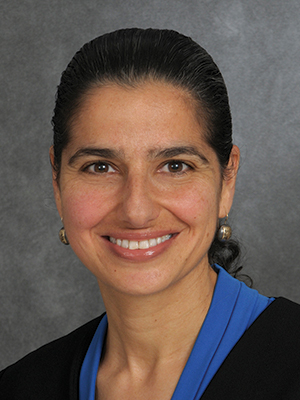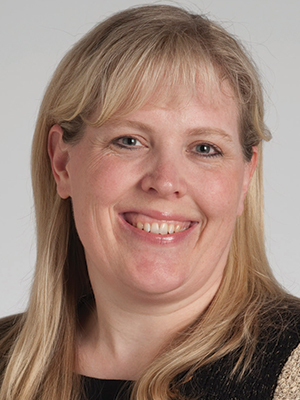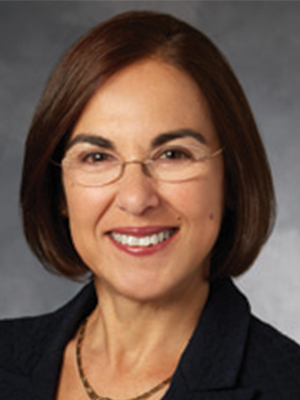My mom doesn’t report all her symptoms to her oncologist. How can I let the doctor know what’s going on?

Iris Cohen Fineberg, Associate Professor and Interim Director of the PhD Program at the School of Social Welfare at Stony Brook University in New York Photo by Jeanne Neville
IRIS COHEN FINEBERG: First, take a step back and ask yourself what you’re concerned about. Does it frustrate you that mom is complaining to you about symptoms and then not reporting them to the doctor? Does the lack of full information just make you uncomfortable? Or is there a potentially dangerous gap in information? You need to establish whether this is more about you and the relationship you have with your mother, or if this is a major concern for your mom’s health.
The next thing you need to consider is what is behind your mom’s omissions. Is it that she doesn’t think the symptoms are important or relevant? Does she not remember them when she talks to the doctor? Is it related to how she views the doctor-patient relationship? Is it her way of trying to keep some control in a situation where she feels none? Or could she be uncomfortable talking about symptoms that could feel very personal?
To sort out the reasons behind your mother’s reluctance to share with her doctor, start by talking with your mom. If she says she just forgot some symptoms, offer to write things down before the next appointment. If she’s embarrassed for one reason or another, ask her if she’s OK with your speaking up in those conversations. If she’s uncomfortable talking to a particular doctor, perhaps there is a nurse or other member of her health care team who could help.
If this is a major health concern and you’ve tried every way you can think of to address the issue without coming to a resolution, let her know that you feel you need to tell the doctor as a matter of safety. Except in the most extreme cases, avoid the urge to call the doctor’s office without her knowledge. That’s a violation of trust that could challenge your relationship with your mom.
Keep in mind the goal: for your mom to receive the best and most comfortable care, with respect and dignity. At the same time, your feelings and needs are valid and important. Caregiving is hard, and it’s vital to find support for yourself while making sure that your issues aren’t getting in the way of your ability to support your mother.
REPORTING CANCER SYMPTOMS // The American Cancer Society has tips on talking with a doctor. // A National Institutes of Health video explains how to prepare for medical appointments. // Cancer Support Community offers resources to help cancer caregivers be more effective and find support.
I’m a cancer survivor, and people always ask about my diet, exercise and smoking history, as if I’m to blame for my illness. How can I respond to them?

Machelle Moeller, Certified Nurse Practitioner in the Cleveland Clinic’s Breast Cancer Program Photo courtesy of the Cleveland Clinic
MACHELLE MOELLER: Living a healthy lifestyle—including maintaining a healthy weight, exercising and not smoking—can reduce a person’s risk of getting cancer. But that’s not the same as suggesting that people who develop cancer of one kind or another are to blame for their disease or that all cancers are preventable.
In thinking about how best to respond to questions that seem to cast blame for your cancer, it can be helpful to consider whether that was really the questioner’s intent. It is natural for people to want to find explanations for why bad things happen. It is possible the people asking those questions are thinking less about your experience and more about their own risk for cancer or that of a loved one. It’s tough for many people to accept that much about cancer is mysterious and cancer can happen to anyone.
When you are ready to respond, consider reminding people that cancer is a complex disease. While there can be many contributing factors, doctors rarely can look at a cancer and point to a specific cause. For example, while smoking can be a primary risk factor in many instances of lung cancer, we also know that people who have never smoked can develop lung cancer.
It is probably best to keep your answers short and sweet. Let people know how those questions make you feel and why, especially if they are coming from people you really care about.
It is extremely common for people who’ve had a diagnosis of cancer to wonder if they are somehow to blame. People often ask themselves questions such as “Why did this happen to me?” or “What did I do wrong?” That can make these potentially “blaming” types of questions from others even harder to take.
Remember that no one deserves cancer. Keep in mind also that we can’t change the past. The best thing you can do as a cancer survivor is to empower yourself with information about how to live a healthy life going forward. If you have questions, talk to your doctor about steps you can take for living a fuller life as a cancer survivor without feeling demoralized or defeated by your diagnosis or its treatment.
COPING WITH BLAME // Slate explores why cancer patients get blamed for their disease. // Cancer Research UK explains how talking can help people cope with blame and anger after a cancer diagnosis. // The American Lung Association discusses the stigma associated with lung cancer and its impact on patients.
I keep hearing about new ways to treat cancer, but my doctor says none of them are right for me. How can I be sure the new treatments won’t help?

Lidia Schapira, Medical Oncologist at Stanford University Medical Center in California Photo courtesy of Lidia Schapira
LIDIA SCHAPIRA: We live in an incredible time for cancer medicine. New cancer treatments frequently appear in the news, along with stories of patients with exceptional responses. It can be daunting for any patient attempting to understand exactly how all these new developments might apply in her particular case, or why they don’t.
One thing to keep in mind is that many patients with a diagnosis of cancer will have a standard-therapy option that is capable of keeping the disease under control. Those treatments have a long track record of success, and there may be no need for you to avail yourself of the newest, most cutting-edge therapies. You might feel as though you’re getting the “same old treatment,” but what you are getting may also be the very best treatment option for you and your cancer.
Another thing to consider is that the new treatment you’ve just read about in the news might carry a hefty price tag. It might also come with physically grueling side effects and relatively modest potential benefits. It may well be that your doctor isn’t recommending that treatment for you because she doesn’t think it’s worth it in your case or at this stage in your treatment.
That said, your question raises important considerations about the nature of your relationship with your doctor. The doctor-patient relationship should be a respectful and collaborative partnership. If your doctor ultimately can’t answer your questions to your satisfaction, consider seeking a second opinion. It is possible another doctor will have something to add that may translate into a tangible benefit for you. At the very least, a second opinion might bring you reassurance that you’re on the right path.
EVALUATING NEW TREATMENTS // Cancer Research Catalyst includes blog posts highlighting drugs recently approved for cancer treatment. // Smart Patients is an online community where patients can learn about new treatment options from each other. // Cancer.Net offers advice on evaluating information about cancer treatments on the internet.
Cancer Today magazine is free to cancer patients, survivors and caregivers who live in the U.S. Subscribe here to receive four issues per year.




